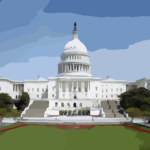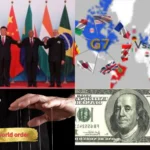KEY TAKEAWAYS:
- Monetary policy is formed and implemented by the central bank of the country to shape the macro-economic elements of the country
- The interest rates and reserve requirements are key tools for implementing policy
- By using expansionary policy, they increase the money supply in markets
- By using a contractionary policy, the central bank restricts the money supply
- They use these policies to control the financial condition of the nation as per their requirements
Monetary policy is the state policy to control the money supply nationwide through various tools for the sustainable economic growth of the country, it is implemented by the central bank of the country. The central banks are so powerful that they can create a crisis or bail a nation out of the crisis as per their requirements, in a general understanding this policy has been utilized to maintain the balance of the economy and for sustainable growth but on the other hand the same system is the biggest reason behind frequent recessions and financial crisis worldwide. To understand how their system works and how this system is digging the financial stability of the world we need to have a look at it in depth. Let’s begin with the types of policy implemented:
TYPES OF MONETARY POLICY:
Monetary policy is implemented to control the flow of money in the market, which means money flow can be reduced or increased as per the requirement of the economy, no matter which type of policy has been implemented central bank used the following tools to control the money supply which are:
- Policy rate
- Reserve requirements
These two tools are principally utilized to control the flow of money. The increasing flow of money in the economy is called “Expansionary monetary policy” and the decreasing flow of money is called “Contractionary monetary policy”. To understand these policy types we need to further elaborate on them
EXPANSIONARY MONETARY POLICY:
Expansionary policy is exactly what it sounds like, it helps to expand the economy by injecting money supply, in this policy central bank reduces the policy rate and reduces the amount of the required reserves resulting in money being supplied in the market instead of being dumped in the banks, when people receive less interest rate they invest or spend their money in the markets instead of depositing it, in the bank by which the demand keeps increasing, in a nutshell, people invest more, earn more and spend more. Some of the key effects of expansionary policy are:
BANKS START GRANTING MORE LOANS:
As the interest rates decrease, the companies ask for more loans from banks to expand their businesses, so, banks begin to lend more and more money to companies which eventually helps to boost their business activities and their earning. On the other hand, banks lend more and earn more interest on loans, it seems like a win-win, but it isn’t, the shady part is by using this policy banks lend money to corporations mostly to make them rich. In a nutshell, banks receive money from whole nations and lend it to big corporations to make them even bigger.
EXCESSIVE GROWTH CAUSE INFLATION:
We discussed above how banks help businesses to expand, and along with expansion people start making more money and spending more as well, the demand for goods and services increases nationwide and positive GDP growth portrays the state as a hero, the authorities start enjoying that appreciation and lose the balance of the economy. Increasing demand results in an increase in the prices of goods and services and the country is hit by inflation, this time again it brings disastrous effects for the working class not the rich.
CONTRACTIONARY MONETARY POLICY:
Contractionary monetary policy is the opposite of expansionary policy, in this policy central bank holds the money supply to control and slow down the economy to prevent a crisis by increasing poverty and inflation, but why central bank do that? As we discussed above when people earn more, they spend more and when they spend more the demand for goods rises, as demand rises the prices rise as well, which is called Inflation. Rising inflation brings crises like poverty, which means people start falling below the poverty line, the majority effect has been faced by the middle class and lower middle class. In this scenario, the central bank holds the money supply by increasing the policy rate and requirement for reserves which helps the economy to slow down but, some of its drastic effects must be discussed which are:
RISE OF THE UNEMPLOYMENT RATE
When central banks increase the interest rate and reserve requirements, it squeezes the commercial banks lending, because businesses can’t afford to get loans at higher rates especially when the economy is slowed down, in such cases companies start downsizing, and the unemployment rate rises. In this way they contract the demand in the market to balance the speedy economy, It is ironic that the working class who don’t have anything to do with these decisions suffer to clean the mess created by capitalists and authorities.
EXPANSIONARY VS CONTRACTIONARY POLICY:
The central bank always looks for how the country prospers economically by controlling macro factors, but these decisions bring positive as well as negative effects for the nation, most of the time the government ignores the working class of their nation for the bigger fish to hunt, they name it “The greater good”. which means they focus on macro factors and speed up the economy causing hyper-inflation On the contrary, speeding up the economy is necessary for example: at the time of covid-19 breakout the whole world was facing an economic crisis at that time most countries lowered their interest rates to minimum, for controlling the increasing economic crisis but post covid that policy backfires and results in hyper-inflation and now many countries are focusing on contractionary policy which will help to slow down inflation but it may also bring the negative effect such as the companies which switch from debt financing to equity financing because of rising interest and many small and medium-sized enterprises can’t bear the effect and shut down their businesses.
CONCLUSION:
No matter which type of policy the central bank implements there are always pros and cons but if we can project the upcoming effect we can get ourselves ready before the storm arrives, that’s why somebody said:
“KNOWLEDGE IS POWER”
If you have the right knowledge at the right time, you can prepare yourself before being affected by government or central bank policies and that is the same policy the corporations use, they always have a plan B, which rescues them from such situations, that is why Warren Buffet. The world’s most successful investor said:
Don’t put all eggs in one basket
Warren Buffet
THANKS!









